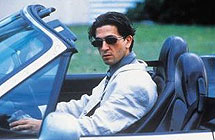|
|
|
|
Walk
the Talk
|
 |
|
The Gold Coast portrayed in Shirley Barrett's second feature is a rather surreal place. Apart from an odd home, apartment or shop – all of them immaculately sterile – we only see casinos, RSL clubs, churches and halls used for motivational seminars. The first striking aspect of Walk the Talk is the deftness with which Barrett establishes this very particular vision of a milieu. What unites this strange assortment of places? They are all places of a certain everyday, public hysteria. They all involve an extremely tacky element of show business. And they all hinge on a certain kind of faith, on virtually mindless enslavement to a dream. As in Barrett's debut feature, Love Serenade (1996), the quiet desperation of it all is overwhelming. Love Serenade was, to me, a thin film marred by grating repetition and sledgehammer ironies. Walk the Talk is unmistakeably the product of the same dark sensibility, but its story and characters are more surprising and disarming. Joey (Salvatore Coco) is an ordinary guy who fixes on the idea of making his life, and the lives of those around him, vastly better. To this end he romances the angry paraplegic Bonita (Sacha Horler), whom he meets at church, and uses her compensation payout to set himself up as an entertainment manager. The problem is, Joey has only one client, with whom he is obsessed. Nikki (Nikki Bennett) has virtually given up performing when Joey approaches her. Now she can barely hold a tune above the roar of the RSL poker machines, so she resorts to pulling what she imagines are solid gold "publicity stunts". Joey's life soon begins unravelling in all directions, leading to desperate measures. After first seeing Walk the Talk, I found it somewhat unfocused and irresolute. The struggle within Bonita between rage and a wish to be pious is never entirely convincing (although Barrett does cannily anticipate the current self-help fad for anti-feminist "surrender"). The film's visual style – washed in sickly blue-green pastels – is inflexible and sometimes dreary. Barrett's trademark touches of hallucinatory unrealism work no better here than in Love Serenade. In particular, I thought Barrett had missed many dramatic opportunities to sharpen the central, three-way conflict between Joey, Bonita and Nikki. The two women, for instance, have only one scene together, and it leads to nothing later. Sex is discreetly factored out of the intrigue. And the exact nature of Joey's feelings for these women – his peculiar configuration of love, lust, domination and the desire to exploit – is clarified only quite late in the story. On a second viewing, the film's unconventional aspects – particularly in the depiction of Joey's screwy psychology – become clearer and stronger. The narrative's various threads never dramatically tangle precisely because Joey is a dissociated anti-hero who (as Barrett puts it) "compartmentalises" everything in his life. He can sincerely love Bonita when he is with her and then, in another situation, tell someone else (apparently just as sincerely) that Bonita is no longer his girlfriend. Joey, in other words, is rather like Rupert Pupkin (Robert De Niro) in Scorsese's The King of Comedy (1982), bouncing irrationally but implacably between two women and a mad showbiz dream. This is only one aspect of Barrett's enormous debt to that movie. What makes Joey a uniquely fascinating character, however, are the unspoken elements of his make-up – his past (completely left blank by the film, in contrast to the women) and the intense Italianness of his manner and behaviour. This is the Aussie Wog Boy seen anew. Coco, in a splendid performance – all wide eyes, relentless jabbering and repressed tension – is a great example of the importance of playing even the most sarcastic comedy perfectly straight. Such smarmy irony – primarily located, as with Love Serenade, in the syrupy old pop standards performed by a succession of bands and belters – sometimes overwhelms Barrett's work. This is especially the case when some of the actors give the impression of being in on the joke and thereby outside their roles. Barrett somewhat uncertainly introduces reflective and melancholic passages – moments of heart, she calls them – perhaps in an attempt to mitigate the darker aspects of her story. As in Love Serenade or the films of Mike Leigh which Barrett admires, there is a bleakness at work here. This reveals itself essentially in the portraits of men like Nikki's father, Marty (Carter Edwards), or her ex-husband, ever ready to deflate her dream of a second chance. Most of Barrett's characters are fuelled by delusion – not just Joey, but everyone who is drawn into the seductive web of believing in an established religion, a zany New Age philosophy or a personal dream of self-improvement. The film's most withering gags are directed at these myriad forms of false consciousness. Vignettes of Joey hamming as a clown for the dubious benefit of zoned-out elderly citizens round out the general tenor of misanthropy. With so much negativity in the air, Barrett's challenge as a storyteller becomes one of finding something – anything at all – worth affirming. It is a challenge she has not yet faced squarely, and her films suffer from that evasion. But Walk the Talk, one of the most impressive and thought-provoking Australian films of recent years, marks a significant advance in Barrett's career. © Adrian Martin March 2001 |
![]()